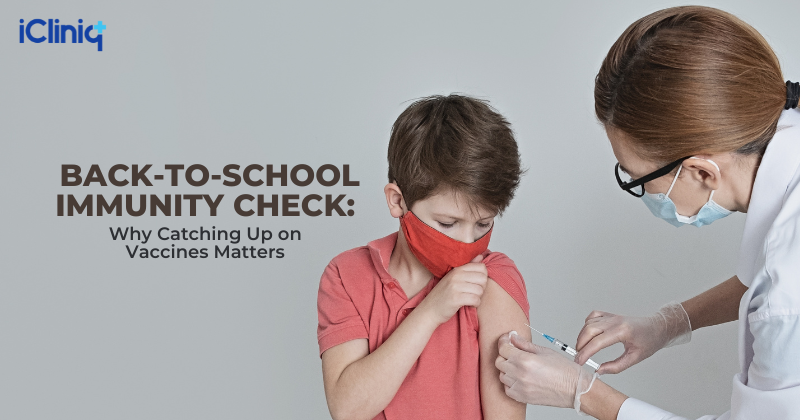Click here to chat with me!
Search our website now
Latest Posts
As schools open, some children are returning to class without full vaccine protection, putting themselves and others at risk. Gaps in immunity can make it easier for illnesses to spread. Back-to-school season is the perfect time to catch up, protect your child, and prevent outbreaks before they start. The Immunity Gap is Real and Risky Gaps in immunization across different age groups have led to more cases of illnesses like measles, whooping cough, and meningitis, especially as students return to school. In high-contact spaces like classrooms, the risk of outbreaks is higher. Reviewing and updating your child's vaccine records can help keep them and their community safe. Why Teens Need Boosters, Not Just Toddlers Immunization does not stop in early childhood; teenagers also need booster shots to remain protected as they grow. Vaccines such as Tdap and HPV are often missed in this age group and can leave adolescents susceptible to potentially preventable diseases. Vaccines protect not only each individual but also help to control the transmission of diseases in schools and communities. Staying updated with adolescent vaccines is important to protect individual and collective health. Vaccines and Learning: The Cognitive Connection Recent studies show that some vaccine-preventable diseases can impact brain development. Measles, for example, is associated with a temporary cognitive lag in children who recover from the infection. Mild infections lead to absenteeism from school, loss of concentration, and falling behind at school. Immunization plays a secondary role in the system of academic achievement by keeping kids healthy and at school at all times. From Paperwork to Protection: What Parents Often Miss Many parents fail to update school health records with the latest vaccine information. More recent guidelines, such as the RSV vaccination for infants or booster shots against COVID-19, are easily overlooked. Keeping your child's medical record up to date is a simple but essential measure towards securing school safety. A single visit can remove unnecessary risk for the rest of the year. Vaccination is not just an individual choice; it is the responsibility of everyone to prevent sickness, promote learning, and keep vulnerable students safe. Start the kids' school year strong, completely shielded and stress-free.
Ahead of Intelligent Health (13-14 September 2023, Basel, Switzerland), we asked Yurii Kryvoborodov, Head of AI & Data Consulting, Unicsoft, his thoughts on the future of AI in healthcare. Do you think the increased usage of Generative AI and LLMs will have a dramatic impact on the healthcare industry and, if so, how? Generative AI is just a part of the disruptive impact of all AI tech on the healthcare industry. It allows to dramatically reduce time efforts, costs and chances of mistakes. Generative AI and LLMs are applied to automating clinical documentation, drug discovery, tailoring of treatment plans to individual patients, real-time clinical decision support and health monitoring, extracting valuable insights from unstructured clinical records, streamlining administrative tasks like billing and claims processing, providing instant access to comprehensive medical knowledge. And this list continues.
We sat with Benjamin von Deschwanden, Co-Founder and CPO at Acodis AG, to ask him his thoughts on the future of AI in healthcare. Do you think the increased usage of Generative AI and LLMs will have a dramatic impact on the healthcare industry and, if so, how? I think that the strength of Generative AI lies in making huge amounts of information accessible without needing to manually sift through the source material. Being able to quickly answer any questions is going to be transformative for everyone working with increasingly bigger data sets.The challenge will be to ensure that the information we get by means of Generative AI is correct and complete – especially in healthcare – as the consequences of wrong data can be fatal. We at Acodis are actively working on practical applications of Generative AI inside our Intelligent Document Processing (IDP) Platform for Life Science and Pharma clients to drive efficiency and accelerate time to market, whilst controlling the risks.
Intelligent Health 2024 returns to Basel, Switzerland on 11th–12th September. We’ve got prominent speakers. An extensive programme. Groundbreaking advancements in #HealthTech. And much, much more. Our incredible 2024 programme will dive deeper than ever before. From sharing the latest innovation insights to exploring use cases of AI application in clinical settings from around the world. All through our industry-renowned talks, limitless networking opportunities, and much-loved, hands-on workshops. Read on to discover what themes await at the world’s largest AI and healthcare summit.
We sat down with Margrietha H. (Greet) Vink, Erasmus MC’s Director of Research Development Office and Smart Health Tech Center, to ask her for her thoughts on the future of AI in healthcare. Do you think the increased usage of Generative AI and LLMs will have a dramatic impact on the healthcare industry and, if so, how? The integration of Generative AI and LLMs into the healthcare industry holds the potential to revolutionise various aspects of patient care, from diagnostics and treatment to administrative tasks and drug development. However, this transformation will require careful consideration of ethical, legal, and practical challenges to ensure that the benefits are realised in a responsible and equitable manner.




